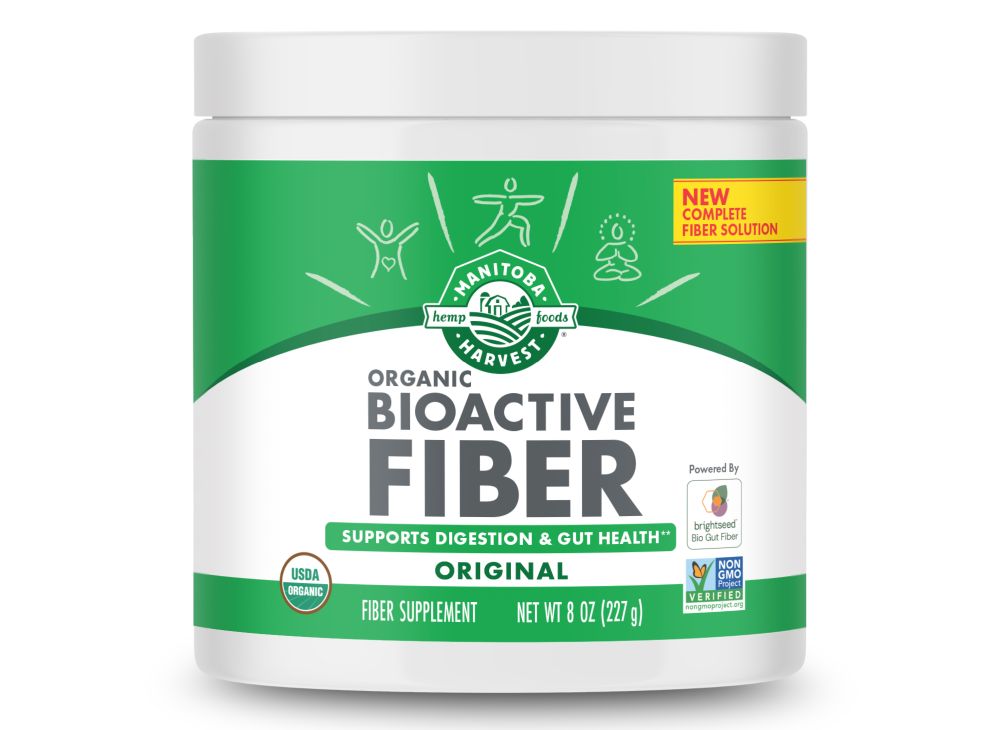[Disclosure: AgFunderNews’ parent company AgFunder is an investor in Brightseed.]
Hemp food specialist Manitoba Harvest has teamed up with foodtech co Brightseed to launch a new product nationwide at Whole Foods in the US featuring Brightseed’s first commercial ingredient: a bioactive fiber offering an intriguing new slant on gut health.
Manitoba Harvest organic bioactive fiber contains psyllium husk fiber and Brightseed’s Bio Gut Fiber, an ingredient sourced from upcycled hemp hulls that contains contains N-trans-caffeoyl tyramine (NCT) and N-trans-feruloyl tyramine (NFT), bioactives that impact a metabolic regulator called HNF4α, which is found in the gut, liver, pancreas and kidneys.
Pre-clinical data has shown NCT and NFT could help clear fat from the liver and support weight management and blood glucose management, opening up multiple potential avenues for novel nutraceuticals and functional foods.
However, Brightseed is initially targeting the gut health space based on pre-clinical data showing NCT and NFT can help maintain the integrity of the gut barrier, a semi-permeable layer of cells that allows the uptake of essential nutrients and immune sensing but keeps out pathogens and unwanted bacteria, VP bioactives Alina Slotnik told AgFunderNews.
“Your gut barrier is a one or two cell membrane that separates your nutrition from your waste, so when you think about it in those terms, it’s pretty stark why you want it to function optimally. It’s been a bit of an unsung hero, but I think that with all the attention on the relationship between your gut and your overall wellbeing lately, that people are beginning to think about gut health more holistically.”
Not all fibers are the same
Thanks in part to recent media attention on firms touting resistant starch and fermentable fibers to curb appetite in the ‘Ozempic era,’ consumers are also becoming increasingly aware that there are many different types of fibers that can impact everything from satiety and glucose management to cardiovascular health as well as providing ‘roughage’ and regular bowel movements, said Slotnik.
“The digestive health part has been understood for while, and then we’ve heard a ton about the microbiome over the past 10 years,” she observed. “But I think the third leg of the stool is your gut barrier, because if that’s not working well, you’re going to really diminish the benefit of the first two things.”
She added: “We’ve been surprised in our research how widely used the term ‘leaky gut’ is now by consumers, although they often think it’s something that only impacts people with gastrointestinal issues and symptoms when it’s actually something that can impact everyone. Very healthy people that do aggressive exercise can have gut barrier issues, for example.”
The Manitoba Harvest product makes fairly generic claims on pack (‘supports digestion and gut health’), coupled with the term ‘bioactives’ and an insoluble fiber content claim. However, data coming out this year should support more specific claims should manufacturers want to make them, says Slotnik.
Market penetration
While the ingredient was first introduced to the trade at the Supply Side West trade show in late 2022, lead times in food and nutraceuticals can be lengthy, acknowledged Brightseed, which struck a deal with plant protein specialist PURIS to create protein crisps containing Bio gut fiber that are designed to be incorporated into bars and other products.
“We have a number of projects in late phase development that include the protein-forward crisps with PURIS and fiber-forward crisps with PGP,” said Slotnik.
The Forager AI platform
Launched by Sofia Elizondo, Dr Lee Chae, and Dr Jim Flatt in 2017, Brightseed harnesses AI and machine learning to illuminate the ‘dark matter’ of nutrition lying untapped in plant and fungal kingdoms.
The San Francisco-based startup—which is working with partners ranging from major CPG companies and ingredients suppliers to pharmaceutical companies—has built a vast database of plant-based compounds associated with biological targets. Its AI-powered Forager platform then predicts how previously untapped plant components might confer specific health benefits and helps identify the optimal way to source or produce them at commercial scale.
Once Brightseed has identified fruitful targets, more traditional analytical methods and clinical testing can then be used to validate its computational work.
Further reading:
Meet the founder: Brightseed’s Dr. Jim Flatt illuminates the ‘dark matter of nutrition’





